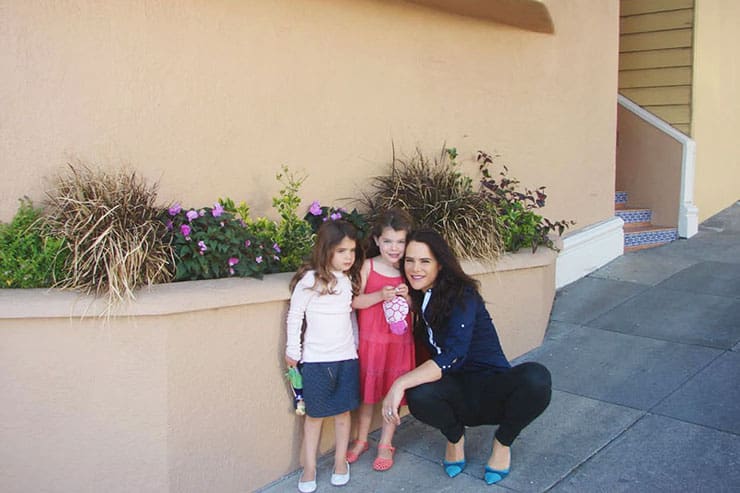
Paths To Motherhood: International Surrogacy
Written by Katie Hintz-Zambrano
Photography by Photo Courtesy of Adrienne Arieff
Knowing that not all families are started the super traditional way (i.e. girl gets pregnant with ease, pops out baby), we bring you our column Paths To Motherhood, highlighting women who have taken a less than typical route to becoming a mother.
Adrienne Arieff, India & Emma
San Francisco, CA
When did you start looking into international surrogacy?
“I got married at 30 and began IVF treatments six years later, when I was 36. After three miscarriages, I was told I should consider adoption or surrogacy, since I was unable to hold my pregnancies. It was terribly disappointing to keep having miscarriages and recover emotionally. I decided to change course, so I started to look into adoption and surrogacy.”
What about international surrogacy appealed to you?
“I chose surrogacy and adoption both initially. The surrogacy clinic responded with a timeline for us to get started within months. The adoption agencies we spoke with had a lot of uncertainty for us, so we decided on surrogacy and then if that didn’t work, we would adopt after one round of IVF with surrogacy. We chose India for two reasons. We read an article on the clinic in the New York Times that was very compelling and spoke to me. I read the article over 100 times in the span of a week. I was certain this was a good option for us. My friend had gone to medical school with the doctor I went to see in India and he had wonderful things to say about her, as well, so we started to get organized after speaking to several of her patients who had good experience with her. Separately, I had a connection to India, since I had spent a fair amount of time in the country for some work in fashion. I also had a powerful experience in Jaipur when I went to heal from the death of my mother. I started to feel like India represented the circle of life to me.”
When and why did you look into international surrogacy instead of domestic surrogacy?
“I chose international instead of domestic surrogacy for two reasons. 1.) There are great doctors and health care facilities for literally 50% less money and less red tape to maneuver in India. 2.) I didn’t want my family and friends to feel sorry for me, since I was tired of people asking me what I was going to do. I don’t like gossip. I was feeling very judged after all the miscarriages, so I went inward and had a very dedicated mantra to going through this process with my husband and him only. I did let my father in on the process, since he is a doctor and supported me with love and generally the most wonderful spirit from day one. My father’s and husband’s love and support carried me the entire process. I will always be grateful for their acceptance and never doubting this choice.”
What is the international surrogacy process like? And what are the fees involved?
“Surrogacy can cost more than $100,000 in America, but in India it was around $35,000 (which is 10-15 years of salary for the average Indian family), and you’re getting the exact same medicine. Also, the laws in the U.S. vary from state to state. Surrogacy is actually illegal in some states and many others have no laws governing the rights of parents or surrogates. But in India there’s a very clear contract that stated our surrogate would hand over our twins after birth.”
What do you feel the pros and cons are of international surrogacy?
“The pros: I am now the mother to 5-year-old twins, Emma and India, who are the biological children of me and my husband. Also, the cost: It’s a lot closer to $35K than the $100K+ you would pay in America. It takes 2.5 tries on average before successful implantation, so the cost for attempts is something to take into consideration. And the chances of success: A proven gestational carrier combined with modern fertility medicine and the best prenatal care give you odds of success that other options may not have offered you. Also, prenatal care: In India, surrogates will most likely choose to stay at communal surrogate housing, so they have daily healthcare. The surrogate is paid equivalent to 15 years salary doing a surrogacy. Since surrogacy is controversial, I was nervous to tell anyone in the beginning, but now I am fine about speaking about it and wrote a book, The Sacred Thread, which has helped thousands of women around the world who have considered surrogacy. I wrote the book so women could read and understand the process, pros and cons, as well as our journey to parenthood.
The cons: Communication. The language barrier, cultural differences, and different time zones may pose challenges. Surrogacy as an industry: Some critics feel strongly that surrogacy is exploitation (a.k.a.: renting a womb). If you feel this way, I do not recommend surrogacy. I am of the belief that if all parties understand what they are getting involved in and have mutually agreed upon terms, there is no exploitation.”
What is the process of finding a surrogate like? How much say do you have?
“In my case, Dr. Patel (my doctor) did the selection for us.”
What is the relationship like before, during, and after she is carrying your children?
“We had a close relationship before, during, and after for a couple years. We spoke on a regular basis. The months leading up to the pregnancy, I was with the surrogate everyday. Now, I have taken a step away to focus on my family. I don’t keep in touch with her anymore, but I have a feeling we will be in touch again. The first years after birth I went to visit her twice .I will tell my kids around 6 or 7, when they are able to understand.”
How long did it take from looking into the international surrogacy to having your twin daughters?
“About 1 ½ years.”
Tell us about the day of their birth. What was it like?
“The day of their birth was magical. I was in the room with my surrogate and it was just a dream. Emma and India were born healthy and then we stayed at the clinic 24/7 for a few days to follow.”
What was the toughest part about choosing this path to motherhood?
“That it was going to be a different type of journey to motherhood and that I had to accept it in all of its challenges. I think pregnancy is a HUGE part of motherhood, so that was really hard on me. I had experienced pregnancy up until almost 7 months, so I really was sad I couldn’t give birth to my now twins. I will always be grateful to our surrogate and would do just about anything for her.”
After going through the process, would you do it again (or recommend it to others)?
“Yes, I would recommend surrogacy, but not to everyone. I would recommend it to anyone who cannot have a child the natural way or has had several miscarriages or infertility issues. It is important to seek counseling and talk to your doctor and others who have done surrogacy. It is a BIG deal. It’s important to not jump without doing the homework.”
Is motherhood everything you thought it would be? Tell us what you love about it!
“It is so much more than what I thought. I have never loved more deeply, honestly, or happily. I love what motherhood stands for. I feel honored to be the mother of Emma and India on a daily basis. Once your children are here, what you’re doing is no different than what every other mother is doing. Now Emma and India are 5-years-old. They’re very fashion-y and girlie. They love purple and pink, bikes, and glitter.”
Share this story



